Are you a Quiet Speculation member?
If not, now is a perfect time to join up! Our powerful tools, breaking-news analysis, and exclusive Discord channel will make sure you stay up to date and ahead of the curve.
Very rarely do I discuss my professional career outside of Magic. This week I want to share a couple of minor details as it relates to this fantastic hobby.
For those who don’t know, I work in research and development at a Fortune 500 company. As a cog in the corporate machine, I meet a ton of new people—there is always someone new coming into a role, someone retiring to be replaced, and new project teams to work with.
To facilitate these “join-ups”, informal one-to-one meetings where we introduce ourselves and share our background inside and outside of work, I have a PowerPoint slide for display. It contains my work history, pictures of my family, and my hobbies and interests outside of work. Included on this slide is my favorite fun fact about me: I write a weekly column for a website about the finance of Magic: the Gathering cards.
Every time I get to this bullet point on my slide, I ask a question…
Tracking Down Lost Collections
Bear with me, this story has a purpose and it relates to Magic. I used the heading “Tracking Down Lost Collections” as a big hint—you probably know where this is going.
When introducing myself to a new co-worker, the first question I’ll ask after mentioning my Magic hobby is if they are familiar with the game. This usually spawns one of three answers:
- No, I haven’t.
- Yes, I think so. Is that like Pokemon?
- Yes, I used to play a while ago.
Each time I bring up my hobby, I get an answer that falls into one of the three categories above. Naturally, I’m most interested in responses of the third variety, where my co-worker not only knows of the game but has even played it in the past. If I get one of the first two responses I politely give a brief summary of what I write about and then we move on. If I receive the third answer, however, I ask the next question: “Do you still have your cards?”
Now we’re getting into statistically infrequent territory. I’ve only met a handful of colleagues who play(ed) Magic (or who are willing to admit they play). Finding those colleagues who not only play(ed) but also still have their cards is even less common. Yet it does happen, and when it does, the most important question comes next.
Obtaining Said Collections
“When did you used to play?”
Depending on the age of my co-workers, the response tends to vary. Most recently, however, I have had two co-workers both state that they still have their collection and they used to play in the mid-1990s. Of course, that could mean a lot of things. They could be sitting on a stack of unplayed Dual Lands and Force of Wills (I met a co-worker like this back in 2007ish) or they could be holding a collection of Fallen Empires, Homelands, and Ice Age bulk. There are a lot of worthless cards in those sets.
No matter the answer, I ask if they can track down their collections and bring them to work so I can appraise them for them. Most of the time if they still own their cards, the cards are sitting in a closet or basement somewhere, untouched for multiple decades. These cards deserve to see play! They deserve to see the light of day! If nothing else, the valuable cards can represent cold hard cash for these colleagues of mine.
I try leveraging these arguments to convince said colleagues to bring in their cards. It’s worked a couple of times, but not many. Luckily, it worked very recently, and I had the pleasure of navigating just such a collection.
About this Collection
My co-worker and his brother used to play back in the day (he’s around my age). When I pressed, he mentioned his collection was still at his parents’ house. Sure enough, after a subsequent visit with his parents, he brought the collection to work.
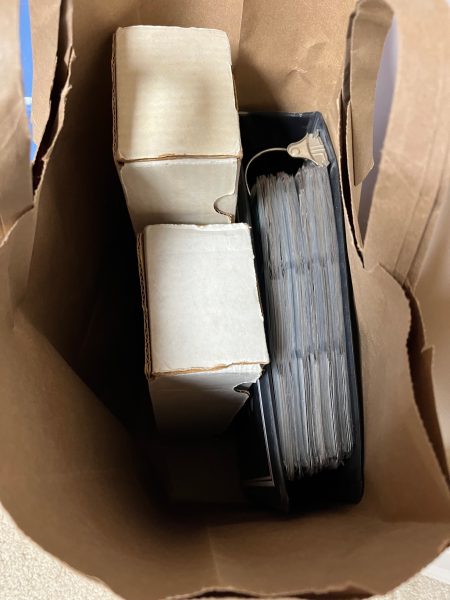
This is exactly how the cards came to me: two boxes and a binder in a paper bag. The boxes were incredible—they had the words “Magic cards” written on them and it was like opening a time capsule.
Immediately I started sifting through the collection digging for Power 9, Dual Lands, and other high-dollar cards. Unfortunately, this collection fell more on the Fallen Empires and Ice Age bulk than the four-figure cardboard spectrum. That didn’t mean there were no valuable cards, however, and it definitely didn’t mean I didn’t have an absolute blast sorting through and organizing the collection to sell for my co-worker.
My Process
When picking a collection, especially a co-worker’s collection, I like to ensure I’m extracting as much value as I can. This demands a rigorous process—one which ensures I can pull out most cards worth picking in a timely fashion.
Finding money cards, especially in older sets without indication of card rarity, can be tricky. Back in 1998, I probably could have picked out most rares from this kind of collection strictly from memory. Those days are gone though. I can still confidently extract cards worth $100 or more with high accuracy, but there are plenty of random $10-$20 cards I don’t know much about thanks to Commander.
The First Pass
Here are two examples of some cards I pulled out of the two boxes in my colleague’s collection. Shatterstorm was one of the pricier pulls, but I didn’t realize how expensive Enlightened Tutor had gotten.
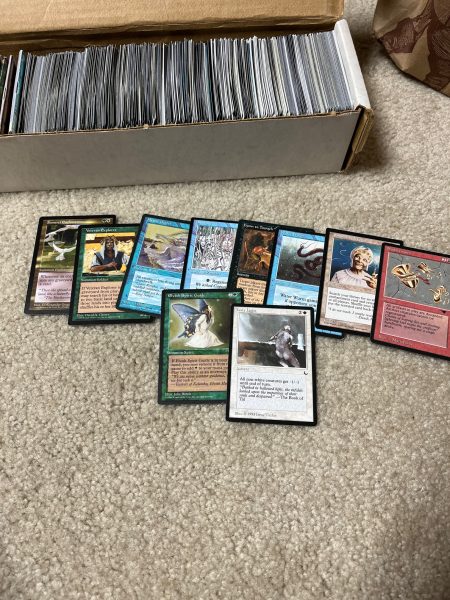
I also thought Veteran Explorer would have been money since it sees (saw?) play in Legacy. Apparently not. Oh, and those cards from The Dark were nearly worthless, and I didn’t expect that.
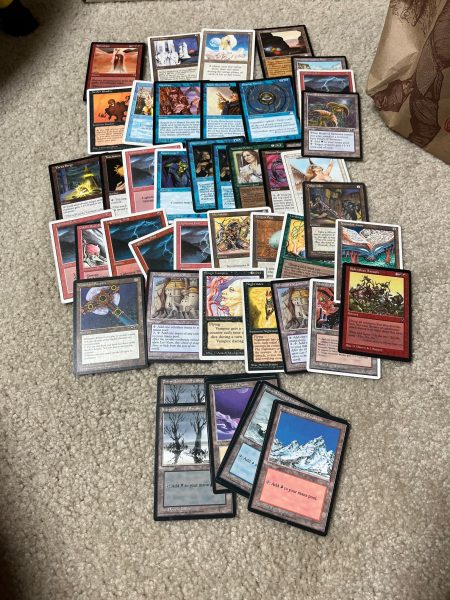
My first pass through the cards was the most exciting, but not the most complete. If you’re familiar with cards from this time period, you’ll know that in the pictures above are some $5-$10 cards, like Didgeridoo, and some near-worthless cards, like Thran Forge. Most excitingly, there’s an Intuition, the most valuable card I found in this collection.
The Second Pass
It was time for the second pass.
In order to maximize value within a reasonable amount of time, I sorted all my co-worker's cards by set and color. Why do this? It’s no secret that I’m a heavy fan of Card Kingdom’s buylist. I don’t run a TCGplayer store and I have no intention of trying to piece out all the cards in this collection one at a time. Instead, I’m going to use Card Kingdom’s buylist as a compromise between decent values for these cards and simplicity.
I’ve found the best way to shop Card Kingdom’s buylist is to organize a stack of cards by set and color. Then, I can bring up the buylist for a specific set (and filter down to commons and uncommons if I want) and compare the cards that show up with the collection. Since I can identify the colors of the money cards, it makes it easier to sift through the smaller piles in order to extract said cards. Sorting the collection didn’t take too long (maybe an hour or so) and it made the buylist process so much easier.
I also made sure to sort Card Kingdom’s buylist by price, highest to lowest. This way I knew I was looking for the most valuable cards in a given set first so that I made the most out of my time. Here’s a quick snapshot of some of the cards I found (before grading):
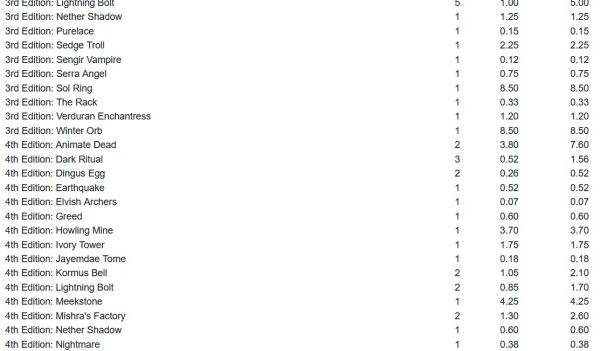
It’s a pretty sizable list, as you can gauge from the snapshot above. The order contained north of 120 cards totaling around $250. (Note: I sold the Intuition, Enlightened Tutor, and a couple of other cards to a friend for $215, so these cards were not included in the Card Kingdom buylist order).
Granted, these cards were not in near-mint condition (especially some of the Revised stuff). I fully expect downgrades closer to the $150-$175 range. Still, not a bad amount for the work, and I’m sure it’ll be a delightful surprise for my co-worker. I already paid him the money for the cards I sold to my friend, and this buylist will give him a second, unexpected deposit.
The Third Pass
Is that the end of the collection? Not quite yet! I often enjoy hunting for those nickels and dimes and I fully anticipate I’ll have time to do so as early as today (Sunday). Once I track down all the cards that are worth picking (using the same strategy as above, only focusing on lower-value cards this time), I’ll submit another buylist to Card Kingdom. This time I’ll mark for trade credit, however, with the hope of racking up enough to justify shipping costs.
That credit will make up the bulk of my “payment” for helping out my co-worker. From there, once it’s only bulk that remains, I’ll have to figure out what to do next. At that point, it’ll be a lower priority.
Wrapping It Up
I hope you enjoyed going on the recent journey down memory lane with me. Browsing through my co-worker’s old collection was like a lens into the past—it genuinely felt like I was looking through my own collection from back in the day. I’ll always have a biased preference for the aesthetics granted by these older cards.
None of this experience would have been possible had I not said something at work about my hobby. In fact, just last week a different co-worker asked me about the games I liked to play and I mentioned Magic. She indicated that she also still had her old cards lying around somewhere. Could I have the good fortune of browsing and picking two such collections in back-to-back months? One could only hope!
My company always encourages its employees to be open, and genuine, and to “bring your full self to work.” I admittedly try to temper my nerdiness at work on some occasions (e.g. meetings with upper management), but when it comes to Magic, this is one instance where being my full self can unlock old collections and even make a little cash for me and a co-worker on the side. I’d call that a true win-win.


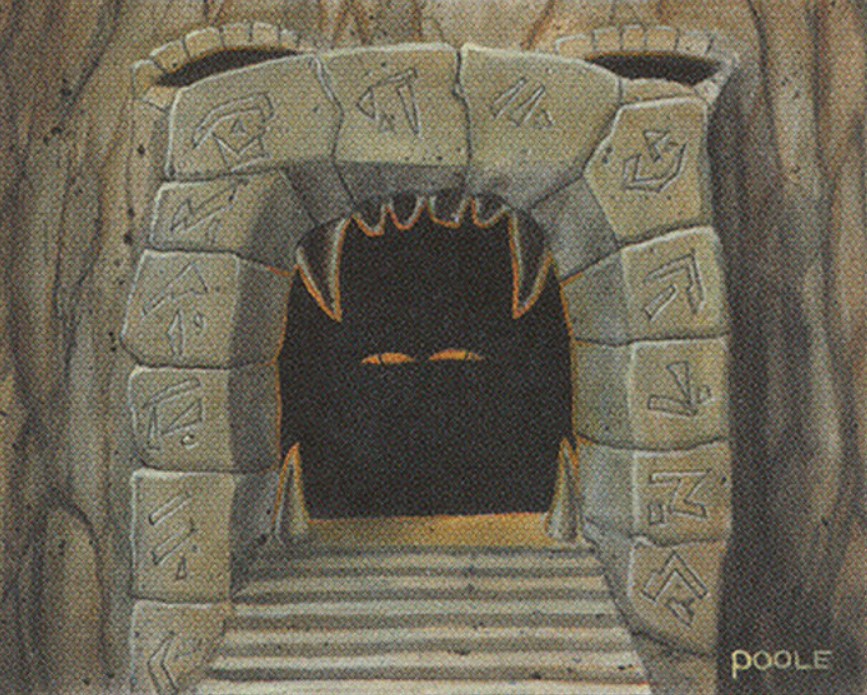


Magic is a niche collection. That’s the way I describe to people and it normally comes off as misterious. But you gradually win them over. Even for people who have never heard of Magic the artwork still feels very mystical because of the game’s deep connection with mana and nature. To most hardcore players it’s just a color.